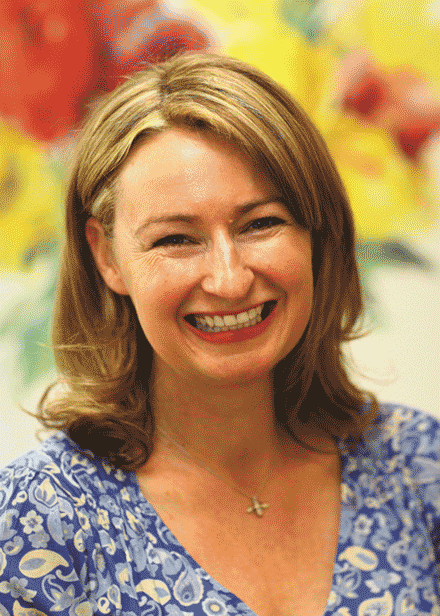Louise Candlish
 Louise Candlish worked as an editor and copywriter before writing fiction. She is the author of nine novels, including her latest book ‘The Disappearance of Emily Marr.
Louise Candlish worked as an editor and copywriter before writing fiction. She is the author of nine novels, including her latest book ‘The Disappearance of Emily Marr.
- Your latest book, ‘The Disappearance of Emily Marr’, follows the story of Tabby Dewhurst, who arrives on the Ile de Ré in France and enters the strange, hidden world of a fellow Englishwoman called Emmie. Emmie’s offer of friendship is at odds with her obsession with her own privacy and soon Tabby begins to form suspicions about her, suspicions that will lead her to a scandal with shattering consequences. What inspired you to write this type of story?
Well, it’s dark and emotional and twisty, which is my kind of book. The Tabby narrative is in fact one of two interwoven strands and it was inspired by my interest in people who live hermit lives. Why is Emmie in hiding? Is her exile self-imposed? The other strand, told by Emily Marr, is set in London, and concerns an adulterous affair that leads to a media scandal. That was inspired by my fascination with – and horror of – media witch-hunts. Both strands are about an intense relationship between two people. In the case of Tabby and Emmie, Emmie is the enigma and Tabby – and the reader – must gather the clues to work her out. - To the readers of the website, that may not be familiar with you or your writing, can tell us a bit about yourself and how you got into writing?
I’ve been writing fiction for ten years and Emily Marr is my ninth novel. My stories are contemporary dramas, often with an emotional crisis or a tragedy at their heart. There is humour, too, I hope. I didn’t have a career plan and am slightly amazed to find myself working on my tenth novel. I would never have predicted that a decade ago. - Which authors do you admire?
Of the living, I admire Anita Shreve, Anne Tyler, Maggie O’Farrell, Rachel Cusk, Margaret Atwood, Tom Wolfe, Jennifer Egan, among others. Of the dead, Vladimir Nabokov, Evelyn Waugh, Anthony Powell, Patrick Hamilton, George Eliot, the Brontës. There are many more, though, I could go on for pages. - What’s your favourite book of all time?
I usually say ‘Brideshead Revisited’,which I think is the perfect book in structure and style, with characters that will never cease to be alluring to us. - Was there ever a book you read that didn’t live up to the hype that surrounded it and left you disappointed?
In an age where almost every publisher claims almost every book to be a powerful and unforgettable new voice, there’ve been lots of let-downs, but I’m not going to name names to you! Of the all-time greats, ‘The Lord of the Rings’ was not for me. - Who is your favourite literary hero/heroine?
I love Sally Jay Gorce in ‘The Dud Avocado’ by Elaine Dundy. She’s the most charming of all the Americans who ever skipped down a Paris boulevard in the 1950s. - What part of the writing process do you find the most difficult?
Deciding on character names is hard for me, I slightly dread it and worry I don’t spend enough time on it. I also find finishing hard as I’m usual on the verge of a nervous breakdown by the time the deadline rolls around. - If you were stranded on a desert island, which three books would you bring with you to pass the time?
‘A Dance to the Music of Time’ by Anthony Powell (the whole 12-volume sequence in one); ‘The Blind Assassin’ by Margaret Atwood; and ‘Madame Bovary’ by Gustave Flaubert. - What area do you suggest a budding writer should concentrate on to further their abilities?
Reading. All the great writers are great readers. That’s how most writers learn how to do it. - When sitting down to write, what is the one item you need beside you?
There is no talisman, just coffee. - And finally, Louise, do you have any projects or releases on the horizon which you would like to share with the readers of the website?
I’ve been very busy this year: as well as ‘The Disappearance of Emily Marr’, I am releasing ‘The Island Hideaway’ later in the year. It’s a stalking story set on the glamorous island of Panarea in Italy. There’s also ‘Summer Affairs’, a collection of three short stories about women doing the wrong thing. Or perhaps it’s the right thing – who am I to say?
Read more about Louise Candlish online or follow her on Twitter Louise Candlish
Leave a Reply